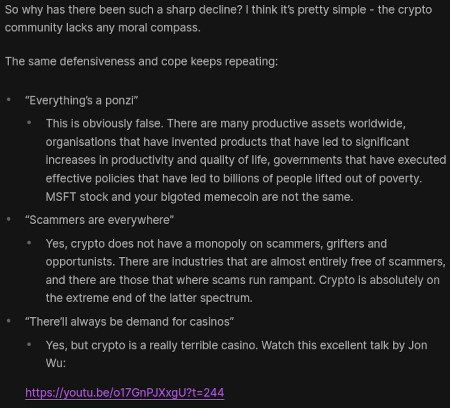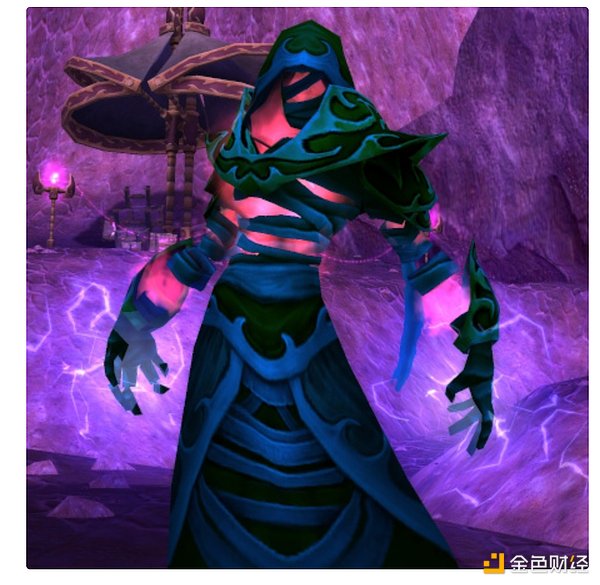Author: vitalik.eth Translation: Shan Oppa, Golden Finance
Ten years ago, two weeks before the public launch of the Ethereum project, I published this article in Bitcoin Magazine arguing that issuing tokens could be a way to finance important public projects. New way. The thinking at the time was this: society needs to fund worthwhile large-scale projects, and markets and institutions (including corporations and governments) are the main tools we have today, both of which work in some cases and fail in others. . Issuing new tokens appears to be a third large-scale financing technology that seems different enough from both markets and institutions to succeed and fail in different areas - so it could fill some important gaps.
People who care about cancer research can hold, accept and trade AntiCancerCoin; people who care about environmental protection will hold and use Climate Coin, and so on. The tokens people choose to use will determine which causes are funded.
Today, in 2024, one of the main topics of discussion in the "crypto space" seems to be meme coins. We've seen meme coins before, as far back as Dogecoin in 2015, and "Dogecoin" has also been a major topic during the 2020-21 season. During this time, they have been heating up again, but in a way that makes many people uneasy because there is nothing particularly new or interesting about these meme coins. In fact, it's often the opposite: Recently, a number of Solana meme coins have been publicly exposed as hyper-racist. Even non-racist meme coins often seem to just move up and down in price without contributing any value afterwards.
People are frustrated:

Even long-time Ethereum philosopher Polynya is very, very unhappy:

Solution One answer to this conundrum is to shake our heads and virtue-signal how much we hate and object to such stupidity. To some extent, this is the right thing to do. But at the same time, we can also ask another question: if people value fun, and financialized games seem to provide that at least sometimes, could there be a corrected version of the whole concept?
Charity Coin
The most interesting coin I have ever seen is one that has a large portion of A coin supply (or some ongoing charging mechanism) dedicated to coins for a charity of some kind. A year and a half ago, there was a token called "GiveWell Inu" (no longer active) that donated proceeds to GiveWell. In the last two years, a coin called "The Fable of the Dragon Tyrant" has appeared, supporting cultural projects related to anti-aging research, among other causes. Unfortunately, both are far from perfect: GiveWell Inu doesn't appear to be maintained anymore, while the other has some very annoying core community members who keep bugging me for attention, making me reluctant to mention it more than once at the moment them. Even more successfully, the Methuselah Foundation, the two Methuselah Foundations, and the Dogelon Mars community seemed to develop a positive-sum relationship with each other after I acquired half of the Dogelon Mars token supply, retroactively converting $ELON to charity currency.
It feels like there's an unclaimed opportunity here to try to create something correct and, more lasting. But ultimately, I think even that creates some fundamental limitations, and we can do better.
Robin Hood Game
In principle, people participate in memecoins because of (i) value May rise, (ii) they feel democratic and open to anyone, and (iii) they are fun. We could drain a large portion of the memecoin supply to support public goods that people value, but this does not directly help participants and actually comes at the expense of (i), which if not done well will (ii) For a price. Can we do something to improve these two aspects for the average user?
The answer to (iii) is simple: don’t just make coins, make games. But make a really meaningful and fun game. Don’t think of Candy Crush on the blockchain; think of World of Warcraft on the blockchain.

p>
"Ethereum Researcher" in World of Warcraft . If you kill one, you get 15 Silver 61 Bronze, and a 0.16% chance of getting some "Ethereum Relay Data". Don't try this in real life.
Now, how about the Robin Hood part? When I travel to low-income Southeast Asian countries, one statement I often hear is that there are people or their family members who were poor before but became moderately wealthy in 2021 through Axie Infinity’s earn-while-playing feature. Of course, Axie Infinity's situation in 2022 will be somewhat unfavorable. But even so, my impression is that if you take into account the "earn-as-you-play" nature of the game,on average, the net financial benefit is negative for high-income users, but possible (emphasis on possible) for low-income users !) is positive. -Revenue User. This seems like a nice property: if you have to be cruel to someone financially, be cruel to those who can handle it, but have a safety net to protect low-income users and even try to make them better off than they came in
No matter how well Axie Infinity does this, it intuitively feels like (i) if the goal is to satisfy people's desire to have fun, we don't Instead of making simple copy-and-paste coins, more complex and interesting games should be made, and (ii) games that make low-income players especially financially better off are more likely to make them The community is better than when they came in. Charity coins and games could even be combined: one of the game's features could be a mechanism whereby players who successfully complete a task can vote on which charities to allocate issued funds to.
That said, making a truly fun game is a challenge - take a look at some of Axie's negative take on fun, and how they've since A positive outlook on how to progress. The team I personally have the most confidence in making interesting crypto games is 0xPARC, as they have successfully made two (!!) crypto games (first Dark Forest, then FrogCrypto) that players are willing to play purely for fun, not Out of a desire to make money. Ideally, the goal is to create a co-created environment that satisfies all players: money is zero-sum, but fun can be positive-sum.
Conclusion
I have a personal code of ethics: "If you don't like a certain type of person or group, be willing to at least praise them for what they're doing The best ones, because they best align with your values." If you hate governments because they infringe on people's freedoms, maybe you can find some space in your heart to say something good about the Swiss government. If you hate social media platforms because they rob users of value and encourage harmful behavior, but you think Reddit is only half as bad as social media, say more good things about Reddit. Doing the opposite - yelling "Yes, there's something wrong with all Any moral appeal.
I feel the same way about the "speculative" part of the crypto space. I have no interest in tokens named after totalitarian political movements, scams, and carpet-pulling that get people excited in month N but upset everyone in month N+1. At the same time, I respect people’s desire to be entertained, and I would rather the crypto space find ways to “go with” that trend rather than swim against it. Therefore, I'd like to see more attention given to higher quality, fun projects that positively contribute to the entire ecosystem and the world around them (rather than just "attracting users"). At the very least, there should be more fun memecoins than crappy memecoins, and ideally they should support public goods rather than just benefit insiders and creators. The ideal thing is to make games instead of tokens, and make projects that people like to participate in.
 JinseFinance
JinseFinance
 JinseFinance
JinseFinance JinseFinance
JinseFinance JinseFinance
JinseFinance JinseFinance
JinseFinance JinseFinance
JinseFinance JinseFinance
JinseFinance Alex
Alex Olive
Olive FNCY
FNCY Cointelegraph
Cointelegraph